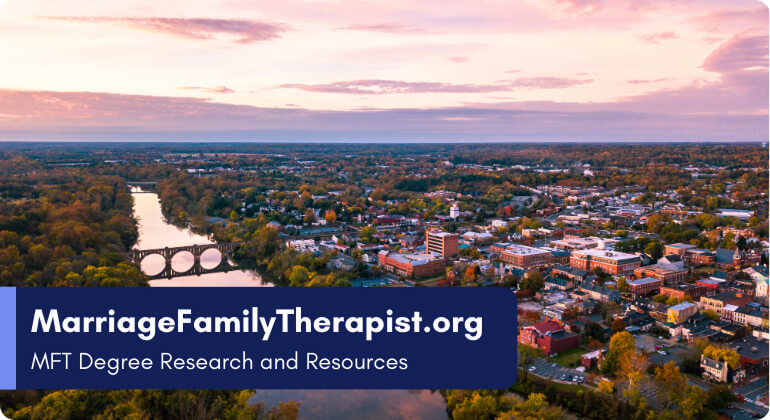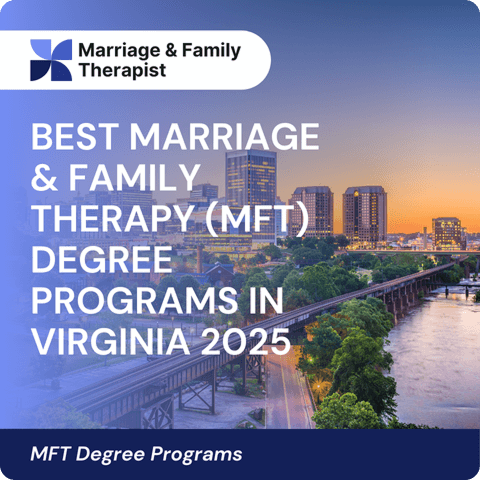Best Marriage & Family Therapy (MFT) Degree Programs in Virginia 2025
Virginia offers several COAMFTE-accredited and regionally approved Marriage and Family Therapy (MFT) programs, providing students with high-quality clinical training and state-approved pathways to licensure. As demand for mental health professionals continues to grow, particularly in urban centers like Richmond, Virginia Beach, and Northern Virginia, as well as rural communities, LMFTs play an important role in expanding mental health and family support services.
In this guide
2026 Best Marriage & Family Therapy (MFT) Programs in Virginia
Virginia Polytechnic Institute and State University
Blacksburg, VA - Public 4-Year - vt.edu
Master's - Master of Marriage and Family Therapy
Campus Based - Visit Website
Virginia Tech's Master of Marriage and Family Therapy, the nation's oldest continuously accredited program, provides comprehensive training through hands-on clinical practice and mentorship. Students address complex family dynamics and mental health issues, with research spanning diverse methodologies, LGBTQ+ families, telemental health, and trauma. The program includes a low-cost therapy center for practical experience, preparing graduates to make meaningful impacts in mental health. As a master's level program, it may require an entrance exam like the GRE, though specifics should be verified with the institution.
- Oldest continuously accredited MFT program
- Doctoral level program available
- Diverse research methodologies
- Clinical and research training
- Focuses on complex family dynamics
- Research across multiple domains
- Low-cost therapy center for practice
Doctorate - PhD in Human Development with a concentration in Marriage and Family Therapy (Marriage and Family Therapy)
Campus Based - Visit Website
Virginia Tech's PhD in Human Development with a Marriage and Family Therapy concentration offers a fully funded, research-intensive doctoral path for those with a clinical master's degree. Emphasizing individualized mentorship and multidisciplinary research centers, it covers developmental theories, systemic analysis, and advanced methods for careers in academia and social services. Located on the Blacksburg campus, it provides tuition waivers and assistantships. As a doctorate program, an entrance exam such as the GRE is typically required, but applicants should confirm current requirements.
- PhD with MFT Concentration
- Requires clinical master's degree
- Full assistantship funding available
- On-campus, in-person program
- December 1st application deadline
- 3.0 minimum GPA required
- Research and teaching opportunities
- Multidisciplinary research centers
- Individual faculty mentorship
- Comprehensive theoretical training
Regent University
Virginia Beach, VA - Private 4-year - regent.edu
Graduate Certificate - Certificate of Graduate Studies in Marriage, Couple & Family Counseling
Online & Campus Based - Visit Website
Regent University's Certificate of Graduate Studies in Marriage, Couple & Family Counseling provides advanced training for mental health professionals seeking specialization. This 12-credit hour hybrid program focuses on developing skills in couples therapy, sexual dysfunction treatment, and addiction counseling. With flexible online and on-campus options and multiple start dates throughout the year, it's designed for working professionals. The program costs $730 per credit hour, totaling $8,760, and prepares graduates for licensure endorsement. No entrance exam is required for this graduate-level certificate program.
- Online and on-campus options
- 12 total credit hours
- $730 per credit hour
- Multiple session start dates
- Professional endorsement for licensure
- Focuses on marriage counseling techniques
- Prepares for various counseling settings
- Next session starts May 12, 2025
Other Accredited MFT Programs in Virginia
- Expanding Mental Health Workforce – Virginia is experiencing a rising need for licensed MFTs, especially in rural areas and community-based counseling centers.
- COAMFTE-Accredited Programs – Multiple universities in Virginia offer COAMFTE-accredited MFT programs, ensuring that students meet national and state licensure standards.
- Comprehensive Clinical Training – Students gain real-world therapy experience through supervised clinical internships in hospitals, private practices, and mental health organizations.
- Flexible Learning Options – Many programs provide on-campus, hybrid, and online courses, making it easier for working professionals and full-time students to complete their degrees.
Virginia offers several accredited MFT programs, ensuring students receive theoretical and practical training required for licensure as an LMFT.
Accredited MFT Programs in Virginia
Regent University – Master of Arts in Marriage, Couple, and Family Counseling
- Regionally accredited counseling program with an MFT specialization, preparing students for LMFT licensure.
- Integrates clinical psychology, relationship counseling, and Christian-based therapy.
- Offers hybrid and online learning options for greater flexibility.
Eastern Virginia Medical School – Master of Science in Marriage and Family Therapy
- COAMFTE-accredited program with a focus on evidence-based therapy, relational interventions, and family dynamics.
- Students complete supervised clinical training in diverse mental health settings, including hospital-based therapy programs and private practices.
- Prepares students for careers in behavioral health, school-based therapy, and private practice.
Virginia’s Quickest MFT Programs
- Virginia Tech’s MFT program can be completed in two years, with structured coursework and early internship placements.
- Regent University’s program offers a 2.5-year MFT track, allowing students to gain supervised experience while finishing coursework.
- Online COAMFTE-accredited programs from neighboring states allow Virginia students to accelerate coursework while completing clinical hours locally.
- Students with prior graduate-level psychology or counseling coursework may qualify for transfer credits, reducing total program length.
For students seeking a fast-track to LMFT licensure, enrolling in a structured program with full-time study options and early clinical experience is the best approach.
Getting an MFT fast allows you to accelerate your path to becoming an LMFT. If you want to learn more about quick MFT programs and what to look for, check out our full guide on quick MFT programs.
Virginia’s Cheapest MFT Programs
- Virginia Tech offers one of the most affordable COAMFTE-accredited MFT programs, making it an excellent choice for budget-conscious students.
- Eastern Virginia Medical School provides tuition assistance, financial aid, and graduate assistantships, reducing out-of-pocket tuition costs.
- Loan forgiveness programs for LMFTs working in underserved areas allow students to offset tuition expenses while gaining clinical experience.
- Online and hybrid MFT programs may offer lower tuition rates, providing greater affordability and flexibility for working students.
For students prioritizing affordability, exploring state tuition assistance programs, scholarships, and employer-sponsored tuition reimbursement can make MFT education more accessible. Students have many options when pursuing an MFT degree to become a therapist which is great in terms of finding a cost-effective program with significant financial aid, scholarships or lower cost programs. Check out our full guide on cheap MFT programs.
How to Become Licensed as an LMFT in Virginia
1. Earn a Master’s or Doctorate in Marriage and Family Therapy
- Complete a COAMFTE-accredited or regionally accredited MFT program that meets Virginia’s licensure requirements.
- Ensure coursework covers family therapy models, ethics, trauma-informed care, and mental health assessments.
2. Complete 3,400 Hours of Supervised Clinical Experience
- Gain post-graduate clinical hours, including 1,750 hours of direct client contact under a licensed MFT supervisor.
- Work in approved therapy settings, such as mental health agencies, hospitals, private practices, or school counseling programs.
3. Pass the National MFT Examination
- Successfully take and pass the Association of Marital and Family Therapy Regulatory Boards (AMFTRB) National MFT Exam.
- Demonstrate competency in therapy interventions, ethical decision-making, and relationship counseling techniques.
4. Apply for Licensure Through the Virginia Board of Counseling
- Submit official transcripts, proof of supervised clinical hours, and passing exam scores for licensure approval.
- Complete any state-specific licensing requirements, including background checks and ethics training.
5. Maintain Licensure with Continuing Education
- Complete 40 continuing education (CE) hours every renewal cycle, including coursework in ethics, trauma-informed care, and specialized therapy techniques.
- Attend professional workshops, conferences, and online training programs to stay updated on best practices in family therapy.
Following these steps ensures a smooth transition from student to licensed LMFT, qualifying professionals to work in private practice, behavioral health organizations, and school-based therapy programs.
LMFT Career & Salary Outlook in Virginia
Virginia offers strong career opportunities for LMFTs, with demand increasing in private practices, school-based counseling programs, and behavioral health organizations. The average salary for LMFTs in Virginia is $65,400 per year, with experienced professionals earning over $100,000 annually.
Where LMFTs Work in Virginia
- Private therapy practices offer high earning potential and flexible work schedules.
- Hospitals and behavioral health organizations employ LMFTs for crisis intervention and integrated care.
- School-based therapy programs allow LMFTs to support children, adolescents, and families in academic settings.
- Teletherapy services are expanding, increasing remote work opportunities for LMFTs.
With competitive salaries, high job demand, and diverse career opportunities, Virginia is a great state for LMFT professionals. Getting an MFT degree opens up many job opportunities and getting licensed as an LMFT expands your options even more. Check out our full jobs guide for prospective MFT students.
Virginia offers several accredited MFT programs, structured licensure pathways, and growing career opportunities for licensed therapists. With affordable tuition rates, flexible program options, and financial incentives for therapists working in underserved areas, Virginia remains an ideal location for aspiring LMFTs.
For students seeking a well-rounded, affordable, and career-driven MFT education, Virginia’s programs provide the clinical training, licensure preparation, and hands-on experience necessary to excel in private practice, community mental health, and behavioral health organizations. Whether working in urban therapy centers or rural mental health programs, LMFTs in Virginia play a vital role in strengthening family relationships and improving mental health care across the state.


Related Articles
- Support That Affirms: Navigating Mental Health as LGBTQ+
- The ROI of an MFT Degree: Analyzing the Financial Investment in Your Therapy Career
- LMFT vs MFT: Is Licensure Necessary for Your Therapy Career?
- From Student to Therapist: What to Expect in Your MFT Clinical Internship
- Who Will You Treat as a Marriage & Family Therapist? A Career Guide for Aspiring MFTs
- MFT Doctorate Degrees: DMFT vs PhD – Who Should Pursue Each Path?